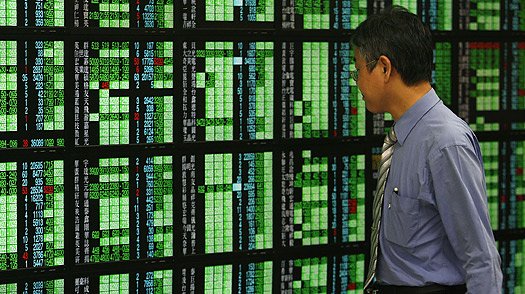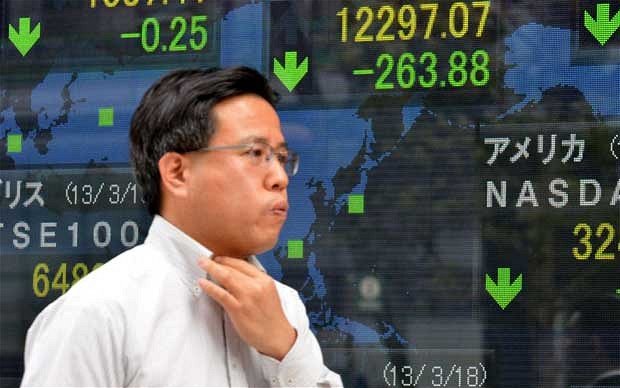Asian stock markets opened higher on November 6 after US stocks hit record highs on Republicans taking control of the Senate.
The Republican victory raised investor hopes for more pro-business and energy-friendly policies from the US government.
The Dow Jones jumped to a new record close of 17,484.53, while the S&P 500 also finished at a record 2,023.57.
Japan’s Nikkei 225 index was up 0.4% to 17,012.71 after five days of gains.
The yen strengthened marginally against the dollar to 114.63, down from 114.69 yen in New York trade.

Asian stock markets opened higher after US stocks hit record highs on Republicans taking control of the Senate
In Greater China, Hong Kong shares opened up 0.2% with the Hang Seng index at 23,737.76.
The benchmark Shanghai Composite index was higher 0.1% to 2,423.23 points.
In Australia, shares were trading lower 0.1% with the benchmark S&P/ASX 200 index at 5,510.20 points despite news that employment figures rebounded in October.
Government data showed that Australia added an estimated 24,100 jobs in October, recovering from a revised 23,700 drop in September. But concerns about the reliability of the data that has been revised a few times in past months weighed on investor sentiment.
Shares of struggling television channel Ten Network rose as much as over 10% in early trade after it said it had hired Citigroup to assess “strategic options” as reports surfaced of takeover offers.
In South Korea, the Kospi index was up over 0.3% at 1,937.78 points.
[youtube zSMtAnMs-Ow 650]
European markets follow Asian shares downward on fears that the plan to bailout Cyprus could trigger an escalation of the eurozone debt crisis.
The EU and IMF want all bank customers to pay a levy in return for a bailout worth 10 billion euros ($13 billion).
London’s 100 share index is 1% lower, while France and Italy are down 2%.
The euro was also affected. Against both the pound and the dollar it lost about 1%, leaving it at 85.7 pence and $1.293 repectively.
Earlier, Japan’s Nikkei 225 index fell 2.7%, while Hong Kong’s Hang Seng and Australia’s ASX 200 dipped 2%.
Banking shares were among the hardest-hit, with Italy’s UniCredit losing almost 5%, Intesa Sanpaolo down 4%. Banco Popolare, which announced a bigger-than-expected annual loss on Friday after the market closed, down almost 5%.
France’s BNP Paribas and Credit Agricole were both down more than 3%.
In Germany, Deutsche Bank was down 3.5% while Commerzbank was 1.5% lower.
Analysts said that investors were divided about whether the developments in Cyprus would affect other bigger eurozone economies, which may also need bailout funds in the future.
Some fear that, if approved, the plan may set a precedent for those countries.

Asian shares fall on fears that the plan to bailout Cyprus could trigger an escalation of the eurozone debt crisis
“There will certainly be confusion in Cyprus, and investors looking just at headlines may fret about its case becoming a model,” said Yuji Saito, director of foreign exchange at Credit Agricole in Tokyo.Analysts said the fresh concerns over the fate of some of the eurozone weaker members, triggered by the developments in Cyprus, had resulted in investors looking to ditch relatively riskier assets.
This is the first time the 17-nation eurozone has sanctioned dipping into people’s savings to finance a bailout.
The plan is yet to be finalized, but the news of the deal caused a rush to the cash machines in Cyprus as people tried to withdraw money.
Under the levy, bank customers with less than 100,000 euros would have to pay 6.75%, while those with more than 100,000 euros would pay 9.9%.
However, depositors in Cypriot banks outside the country, including in Greece, are unaffected by the levy.
But the plan is yet to be finalized and Cyprus’s leaders have said they want to ensure protection for small investors.
Meanwhile, an emergency session of the Cypriot parliament has been postponed until later on Monday.
Also, Germany must approve the plan, but is not due to vote until next month.
Following eurozone finance ministers’ negotiations last week, Cyprus became the fifth euro-area country to get a bailout to save its banks, which suffered significant losses because of their exposure to Greek debt.
[youtube YSUzRZZp-3M]
European and Asian markets have gained after a short-term deal to stave off the so-called US fiscal cliff was reached.
UK shares jumped 1.5% while other European indexes were also higher.
Failure to agree a deal would have triggered spending cuts and tax increases worth $600 billion.
There had been fears that the measures would have derailed the modest recovery in the world’s biggest economy and perhaps even push it back into recession.
German stocks gained by 1.6%, while France’s Cac 40 rose 1.4% and Italy’s stocks gained 2%.
In the US, the lower chamber of Congress passed a deal backing a compromise that had already passed in the Senate, which raises taxes for the wealthy and delays spending cuts for two months.
The fiscal cliff measures – cutting spending and increasing taxes dramatically – came into effect automatically at midnight on Monday when George W. Bush-era tax cuts expired.

European and Asian markets have gained after a short-term deal to stave off the so-called US fiscal cliff was reached
The 31st of December deadline triggered tax increases of about $536 billion and spending cuts of $109bn from domestic and military programmes – which has now been averted.
Shares worldwide had been hurt in November and December by fears that the US would not be able to reach any kind of agreement and would go off the cliff.
Earlier, Asian shares gained on the news of the deal. The US is also a key market for most of Asia’s export-dependent economies.
The US dollar rose, jumping against the Japanese yen. The Japanese currency was at 87.30 yen against the US dollar at one point, its lowest level since July 2010.
The yen has fallen almost 9% against the US dollar since November 15.



